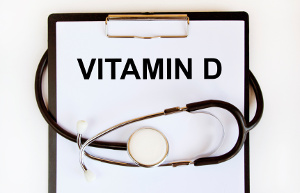Vitamin D counteracts cancer via the gut flora
 Danish scientists from Aalborg University have published a study of mice in which they demonstrate that vitamin D prevents cancer by affecting a particular kind of gut bacteria. A subsequent analysis of 1.5 million Danes shows a similar relation between low vitamin D levels in the blood and an increased risk of several cancer types. What is also worth mentioning is that the official vitamin D recommendations appear to be too low to be able optimize blood levels of the nutrient.
Danish scientists from Aalborg University have published a study of mice in which they demonstrate that vitamin D prevents cancer by affecting a particular kind of gut bacteria. A subsequent analysis of 1.5 million Danes shows a similar relation between low vitamin D levels in the blood and an increased risk of several cancer types. What is also worth mentioning is that the official vitamin D recommendations appear to be too low to be able optimize blood levels of the nutrient.
Vitamin D is known for its role in bone health, and the current recommendations for vitamin D intake are primarily focused on this health aspect. However, nearly all the body’s cells have vitamin D receptors (VDR) that control a host of different genes and metabolic processes, including the immune defense and its ability to fight abnormal cells. That is why it is essential to always have optimal blood levels of vitamin D – also in relation to cancer prevention – and decades of research underpin this.
Apparently, vitamin D also protects against cancer by affecting our natural intestinal microflora that consists of billions of different bacteria, fungi, and viruses. Professor Tine Jess from Aalborg University Hospitals in collaboration with scientists from the Francis Crick Institute in London and National Cancer institute in Maryland, USA, have conducted a thorough study of this relation. Their research consisted of laboratory research with mice and subsequent analyses of large amounts of human data.
They first conducted research on mice with experimentally transplanted cancers. When these mice were given a diet with a high vitamin D content, they showed improved resistance and responded more favorably to immunotherapy.
Vitamin D affects the intestinal mucosa and a particular type of bacteria
The study showed that vitamin D has a positive impact on the intestinal endothelial cells and increases levels of a specific bacterium called Bacteroides fragilis. This bacterium slows down the growth rate of the transplanted tumors. Bacteroides fragilis is also part of the normal microflora in the human bowel and is viewed as an opportunistic pathogen because it can cause boils and infections in other parts of the body. According to the new study, Bacteroides fragilis has an important function in the gut flora and belongs here.
The study is published in the journal Science and suggests a previously unknown relation between vitamin D, the intestinal microflora, and the body’s immune response towards cancer. This sheds a whole new light on vitamin D’s potential in cancer prevention and cancer therapy.
Vitamin D also protects against cancer in humans
Tine Jess and her research colleagues from the Center for Molecular Prediction of Inflammatory Bowel (PREDICT) at Aalborg University also studied whether these results applied to humans. PREDICT primarily focuses on chronic inflammatory bowel disorders, a problem that affects millions of people worldwide. The center has access to an abundance of health information about Danes via a comprehensive health registry that is quite unique for Denmark.
The scientists analyzed different health data from more than 1.5 million Danes and found a link between low vitamin D levels in the blood and an increased risk of developing different cancer forms, including stomach cancer, lung cancer, and cancer of the urinary tract. A separate analysis also showed that cancer patients with high vitamin D levels in their blood responded more favorably to immunotherapies.
According to Tine Jess, the results of the studies on mice align with human analyses, so it appears that having sufficient vitamin D in the blood can improve the gut flora and immune defense, thereby lowering the risk of cancer.
Most of us need much more vitamin D
The official recommendations for vitamin D intake lie in the range of 5-20 micrograms daily. This, however, is no guarantee of reaching an optimal blood level of vitamin D, which should ideally be 75 nmol/L or more in order to protect against cancer and many other diseases. According to a recent meta-analysis that is published in Nutrients, it takes at least 50 micrograms of vitamin D daily to reach that level. Most people with light skin are able to synthesize that amount of vitamin D by exposing themselves to 10-15 minutes of sunshine on a normal summer’s day. Older people and people with dark skin usually need more sun exposure to produce a similar amount of vitamin D.
References
Evangelos Giampazolias et al. Vitamin D regulates microbiome-dependent cancer immunity. Science, 25 Apr 2024
Nina Hermansen. Forskning påviser sammenhæng mellem lavt D-vitamin og højere risiko for kræft. Aalborg Universitet. Lagt online: 28.04.2024
Paulette D Chandler et al. Effect of Vitamin D3 Supplements on Development of Advanced Cancer. JAMA 2020
Pawel Pludowsky et al. Vitamin D Supplementation: A review of the Evidence Arguing for a Daily Dose of 2000 International Units (50 µg) of vitamin D for adults in the General Population. Nutrients 2024
TIP! See also the related articles
Search for more information...
- Created on .








